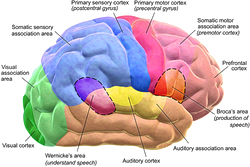
You Are What You Eat!
Before you cut into that big juicy T-bone steak, you should consider something: What we eat has an impact on how we think (cognitive processing) and use our memory, especially as we age.
Our brain is one of the most vital organs, responsible for day-to-day functions. It is in charge of ensuring that our heart keeps beating and our lungs keep breathing. That is why a healthy brain is essential for living a long, healthy life.
The foods we consume play a major role in regulating brain health, impacting mental tasks such as concentration and memory.
Listed below are some foods that are associated with keeping a brain healthy.
Blueberries

In addition to providing numerous health benefits, blueberries are specifically good for the brain.
Anthocyanins are a group of plant compounds that contain antioxidant and anti-inflammatory effects. They are found in abundance in blueberries. Antioxidants deter brain aging and brain diseases such as dementia as they act against both inflammation and oxidative stress. Studies have shown that antioxidants in blueberries accumulate in the brain and improve communication by repairing neurons. Try blueberries for breakfast along with Greek yogurt. Add a few peanuts as well.
Fatty Fish
This category includes fish such as trout, salmon, and sardines which are great sources of omega-3 fatty acids. Approximately 60% of our brain is made up of fat and half of that fat is omega-3.
Omega-3 is used to build up nerve cells which are essential for memory and learning. It also has other health benefits as it helps in warding off Alzheimer’s disease by delaying age-related decline in cognition. On the other hand, not getting enough omega-3 is associated with depression and hampers learning.
Gray matter is a substance that controls emotion, memory, and decision-making. People who consume broiled or baked fish regularly tend to have more gray matter in their brains and that is no doubt a good thing.
Coffee
If drinking coffee in the morning is the norm for you, then you will be glad to know that it is good for your brain’s health.
The two main components in coffee that are beneficial are caffeine and antioxidants.
The benefits of caffeine are as follows:
- Increased alertness. Adenosine is a chemical messenger that is responsible for making you feel sleepy and caffeine helps to block it.
- Improved mood. Caffeine is associated with boosting the chemical serotonin which is responsible for making us feel good.
- Heightened concentration. A study conducted on assessing the benefits of coffee found that people who drank it in the morning or kept taking smaller servings throughout the day were more effective at tasks that require concentration.
Turmeric
This spice has garnered a lot of attention in recent times. Most commonly used in curries, this dark yellow spice carries numerous health benefits for the brain.
Curcumin is an ingredient that is found in turmeric and can directly access the brain to benefit the cells. Apart from antioxidant and anti-inflammatory properties, curcumin has the following advantages:
- Promotes the growth of new brain cells. It helps in boosting brain-derived neurons which is a growth hormone directly responsible for the growth of brain cells.
- Eases depression. Serotonin and dopamine which are responsible for making us feel good are boosted by curcumin. One study found that it alleviated depression symptoms in under six weeks, similar to the effects of antidepressants but without the drawbacks of pharmaceutical drugs.
To utilize the benefits of curcumin, start using curry powder or add turmeric to tea or potato dishes.
Dark Chocolate

Dark chocolate and cocoa powder contain elements that carry numerous benefits for the brain such as caffeine, antioxidants, and flavonoids (antioxidant plant compounds). The flavonoids in chocolate are particularly beneficial for memory and learning. These compounds are known to slow down age-related mental decline and also play a role in enhancing your memory.
In a study conducted to assess the benefits of dark chocolate, it was found that from a sample of 900 people, those who ate chocolate more frequently showed improved performance in several mental tests (some involving memory as well) as compared to those who consumed it sometimes.
Chocolate is also linked to boosting mood and is associated with positive feelings. Though for some people that is triggered because of the taste.
Nuts
Almonds, in particular, are linked to having a sharper memory and contain antioxidants and vitamin E. Vitamin E not only slows down mental decline but also shields cell membranes from damage. Walnuts are extremely beneficial as they are rich in omega-3 fatty acids.
Eating nuts has been linked not only to a healthy brain but also to improving cardiovascular health. Nuts boost your immune system to prevent neurodegenerative diseases as well as improve cognition.
The Bottom Line
You may not turn into an Einstein but eating the right brain foods can certainly help your concentration. Just as many foods can keep your brain healthy, some can hamper development and make you prone to mental diseases.
Steer clear of foods with saturated fats that are known to raise blood pressure and are associated with bad cholesterol. Processed meat, excess sugar, and other foods that contain trans fats such as junk food are bad for your brain.
You can help boost your memory and alertness by smartly (pun intended) including the above-mentioned foods in your diet, and it is always a good idea to get advice from your medical provider as well.





 According to statistics, around 25% of Americans develop insomnia each year and other studies show that around 50-70 million adults in the US have some form of
According to statistics, around 25% of Americans develop insomnia each year and other studies show that around 50-70 million adults in the US have some form of  Water provides soft resistance to your body by making it an exceptionally good exercise for people with injuries or arthritis. Water provides 12 times more resistance compared to air but it lessens the stress of gravitational pull. This is the reason why a 30-minute swimming session won’t tire you out. On the other hand, a 30-minute cardio session will not only tire you but can strain your joints and muscles.
Water provides soft resistance to your body by making it an exceptionally good exercise for people with injuries or arthritis. Water provides 12 times more resistance compared to air but it lessens the stress of gravitational pull. This is the reason why a 30-minute swimming session won’t tire you out. On the other hand, a 30-minute cardio session will not only tire you but can strain your joints and muscles.  Regular swimming can help you guard against most cardiovascular diseases. Swimming for 30 minutes at least three times a week can significantly lower your
Regular swimming can help you guard against most cardiovascular diseases. Swimming for 30 minutes at least three times a week can significantly lower your  Water exercises are a good way to engage with friends and the community. This great leisure-time activity can help you meet people, relax and share your thoughts. It provides a platform for social interaction. Since man is a social animal, such positive social interaction has a great effect on overall mental and physical health.
Water exercises are a good way to engage with friends and the community. This great leisure-time activity can help you meet people, relax and share your thoughts. It provides a platform for social interaction. Since man is a social animal, such positive social interaction has a great effect on overall mental and physical health.  According to statistics, depression is one of the most common psychological disorders in the United States. It affects about 6.7% of the adult US population each year. Depression is more common in women than in men.
According to statistics, depression is one of the most common psychological disorders in the United States. It affects about 6.7% of the adult US population each year. Depression is more common in women than in men.  Deep frying is commonly used for cooking at both home and fast food restaurants because it is a less expensive method of preparing a dish.
Deep frying is commonly used for cooking at both home and fast food restaurants because it is a less expensive method of preparing a dish. We all know that exercise benefits us both physically and mentally, but there are so many types of exercising. Here we will discuss why so many experts are adamant about
We all know that exercise benefits us both physically and mentally, but there are so many types of exercising. Here we will discuss why so many experts are adamant about  A
A 


 Now that you know the advantage different workout times hold for you, check out the following strategies that can make you get the most from your training.
Now that you know the advantage different workout times hold for you, check out the following strategies that can make you get the most from your training.  To pick a time that is most optimal for exercise, experts recommend going for the morning sweat. Early workouts make the most of your physiology and biology and do wonders in the long run.
To pick a time that is most optimal for exercise, experts recommend going for the morning sweat. Early workouts make the most of your physiology and biology and do wonders in the long run. 

 Many people underestimate the significance of foods that uplift the mood. A good demeanor is not just a fleeting mental phenomenon. By keeping your mood good, you can mitigate the effects of chronic stress. Mood also helps alleviate the symptoms of depression and anxiety. In short, how your mood fares affect your mental health and consequently dictates the quality of your life.
Many people underestimate the significance of foods that uplift the mood. A good demeanor is not just a fleeting mental phenomenon. By keeping your mood good, you can mitigate the effects of chronic stress. Mood also helps alleviate the symptoms of depression and anxiety. In short, how your mood fares affect your mental health and consequently dictates the quality of your life. 
 For many years,
For many years, 
 How many of us get so tired at work that we actually start falling asleep at the desk?
How many of us get so tired at work that we actually start falling asleep at the desk? If you do have problems sleeping, it may be due to a physical factor, such as
If you do have problems sleeping, it may be due to a physical factor, such as 

 No doubt there is contention these days about how much the government should regulate health care. We will stay out of the political gamut and simply say based on what we already know about vaping, we agree with those states that are changing the laws. Teenagers are most vulnerable to this and so upping the age from 18 to 21 is a great start.
No doubt there is contention these days about how much the government should regulate health care. We will stay out of the political gamut and simply say based on what we already know about vaping, we agree with those states that are changing the laws. Teenagers are most vulnerable to this and so upping the age from 18 to 21 is a great start. Americans have been increasing their dosage and intake of antidepressants like Prozac, Celexa, and Effexol just to name a few. According to a
Americans have been increasing their dosage and intake of antidepressants like Prozac, Celexa, and Effexol just to name a few. According to a Medical science, with all its innovations and advancements, has still not managed to tackle the underlying causes behind mental health issues. Surely, elements such as trauma and high stress have been identified as causation factors but doctors still have not been able to identify the root cause behind mental problems.
Medical science, with all its innovations and advancements, has still not managed to tackle the underlying causes behind mental health issues. Surely, elements such as trauma and high stress have been identified as causation factors but doctors still have not been able to identify the root cause behind mental problems.